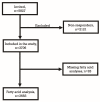Plasma Trans Fatty Acid Levels, Cardiovascular Risk Factors and Lifestyle: Results from the Akershus Cardiac Examination 1950 Study
- PMID: 32423040
- PMCID: PMC7284775
- DOI: 10.3390/nu12051419
Plasma Trans Fatty Acid Levels, Cardiovascular Risk Factors and Lifestyle: Results from the Akershus Cardiac Examination 1950 Study
Abstract
Intake of industrially produced trans fatty acids (iTFAs) has previously been associated with dyslipidemia, insulin resistance, hypertension and inflammation, as well as increased cardiovascular (CV) morbidity and mortality. iTFA intake declined in Norway after the introduction of legislative bans against iTFA consumption. However, the relationship between the current iTFA intake and CV health is unclear. The aim of the present study was to investigate the association between current iTFA intake, reflected by plasma iTFA levels, and established CV risk factors. We also examined the associations between plasma ruminant TFA levels and CV risk factors. In this cross-sectional study, we included 3706 participants from a Norwegian general population, born in 1950 and residing in Akershus County, Norway. The statistical method was multivariable linear regression. Plasma iTFA levels were inversely associated with serum triglycerides (p < 0.001), fasting plasma glucose (p < 0.001), body mass index (p < 0.001), systolic and diastolic blood pressure (p = 0.001 and p = 0.03) and C-reactive protein (p = 0.001). Furthermore, high plasma iTFA levels were associated with higher education and less smoking and alcohol consumption. We found that plasma ruminant trans fatty acids (rTFA) levels were favorably associated with CV risk factors. Furthermore, plasma iTFA levels were inversely associated with CV risk factors. However, our results might have been driven by lifestyle factors. Overall, our findings suggest that the current low intake of iTFAs in Norway does not constitute a threat to CV health.
Keywords: cardiovascular health; cardiovascular risk factors; industrial trans fatty acids; legislative bans; ruminant trans fatty acids.
Conflict of interest statement
The authors have no conflict of interest to declare. Funders were not involved in organizing the study; collecting, analyzing, or interpreting the data; preparing the manuscript; or in the decision to publish the final results. Findings in the present study are unpublished and are not under consideration for publication elsewhere.
Figures
References
-
- Pietinen P., Ascherio A., Korhonen P., Hartman A.M., Willett W.C., Albanes D., Virtamo J. Intake of fatty acids and risk of coronary heart disease in a cohort of Finnish men. The Alpha-Tocopherol, Beta-Carotene Cancer Prevention Study. Am. J. Epidemiol. 1997;145:876–887. doi: 10.1093/oxfordjournals.aje.a009047. - DOI - PubMed
MeSH terms
Substances
Grants and funding
LinkOut - more resources
Full Text Sources
Medical
Research Materials



